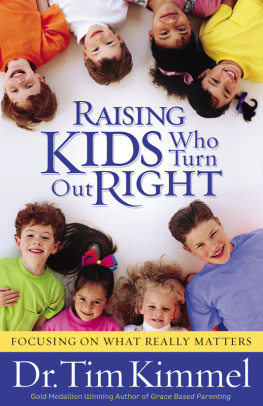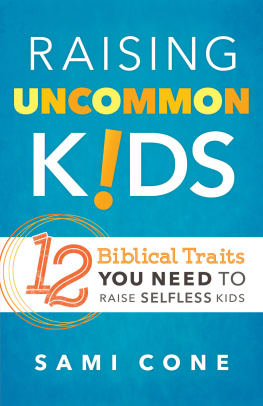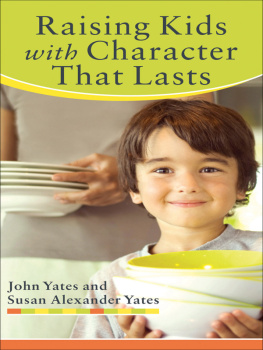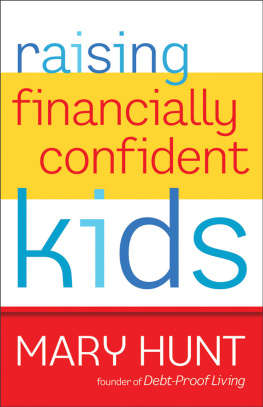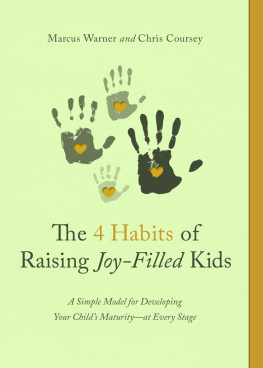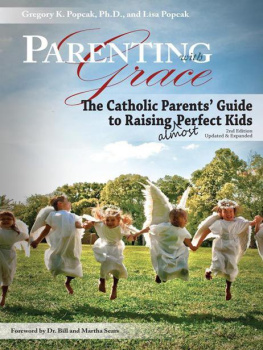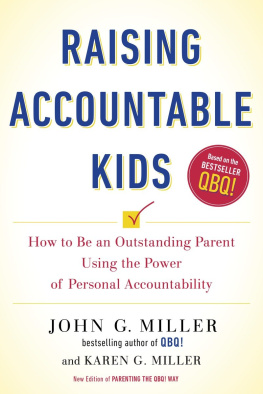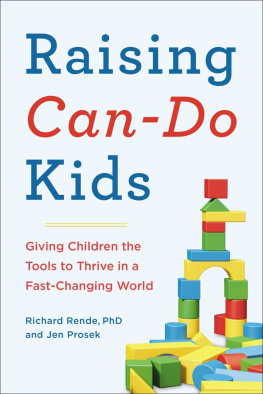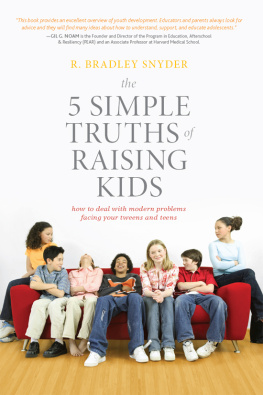John Grabowski - Raising Catholic Kids for Their Vocations
Here you can read online John Grabowski - Raising Catholic Kids for Their Vocations full text of the book (entire story) in english for free. Download pdf and epub, get meaning, cover and reviews about this ebook. year: 2019, publisher: TAN Books, genre: Home and family. Description of the work, (preface) as well as reviews are available. Best literature library LitArk.com created for fans of good reading and offers a wide selection of genres:
Romance novel
Science fiction
Adventure
Detective
Science
History
Home and family
Prose
Art
Politics
Computer
Non-fiction
Religion
Business
Children
Humor
Choose a favorite category and find really read worthwhile books. Enjoy immersion in the world of imagination, feel the emotions of the characters or learn something new for yourself, make an fascinating discovery.

- Book:Raising Catholic Kids for Their Vocations
- Author:
- Publisher:TAN Books
- Genre:
- Year:2019
- Rating:4 / 5
- Favourites:Add to favourites
- Your mark:
- 80
- 1
- 2
- 3
- 4
- 5
Raising Catholic Kids for Their Vocations: summary, description and annotation
We offer to read an annotation, description, summary or preface (depends on what the author of the book "Raising Catholic Kids for Their Vocations" wrote himself). If you haven't found the necessary information about the book — write in the comments, we will try to find it.
Raising Catholic Kids for Their Vocations — read online for free the complete book (whole text) full work
Below is the text of the book, divided by pages. System saving the place of the last page read, allows you to conveniently read the book "Raising Catholic Kids for Their Vocations" online for free, without having to search again every time where you left off. Put a bookmark, and you can go to the page where you finished reading at any time.
Font size:
Interval:
Bookmark:
Raising Catholic Kids for Their Vocations
KIDS FOR THEIR
VOCATIONS
John and Claire Grabowski
TAN Books
Charlotte, North Carolina
Copyright 2019 John and Claire Grabowski
All rights reserved. With the exception of short excerpts used in critical review, no part of this work may be reproduced, transmitted, or stored in any form whatsoever without the prior written permission of the publisher.
Scripture quotations are from the New American Bible, revised edition, copyright 2010, 1991, 1986, 1970 Confraternity of Christian Doctrine, Inc., Washington, DC. Used by permission. All rights reserved.
Excerpts from the English translation of the Catechism of the Catholic Church for use in the United States of America 1994, United States Catholic Conference, Inc. Libreria Editrice Vaticana. Used with permission.
Passages from papal documents, encyclicals, and addresses Copyright Libreria Editrice Vaticana unless otherwise noted. All rights reserved.
Cover design by Caroline K. Green
Cover image:
Library of Congress Control Number: 2019931273
ISBN: 978-1-5051-1376-1
Published in the United States by
TAN Books
PO Box 410487
Charlotte, NC 28241
www.TANBooks.com
Printed in the United States of America
For Rachel, Rebekah, Paul, Daniel, and Abigail who taught
us how to be parents and always forgave us when we failed
CONTENTS
W e would like to thank the many people who supported, encouraged, and assisted us in writing this book. The staff at the Word Among Us Press first suggested this book to us, worked with us on its development, and were gracious and professional throughout our dealings with them. We are especially indebted to Patty Mitchell, Beth MacNamara, Cindy Cavnar, and Jeff Smith. When it became clear that our project differed from their vision, they encouraged us to seek another publisher and freely shared the work and effort they had invested in the book to that point.
We are also thankful for the wonderful people at TAN Books who welcomed this project at a fairly advanced stage and worked to expedite its publication. We are grateful to Paul Grabowski (our son who works in marketing for the company), Mara Persic, John Moorehouse (the Acquisitions Editor), and Conor Gallagher (the Publisher) for their enthusiastic reception and support throughout this process.
In addition to the staff at these two fine publishers, we would like to thank Adriene Pedraza and Melanie Danner for many hours of generous proofreading and constructive suggestions on earlier versions of this manuscript. We are grateful to our children for each contributing a short section to this book, for their love and support, and for their Christian witness to us. It is to them that we dedicate this book.
W hen we were first contacted by the Word Among Us Press about writing this book, we almost declined the offer. John already had four other book projects lined up and at various stages of completion and thought that one more would be too much. Initially Claire also decided against it, thinking we were being asked to write a work about marriage. We were in the process of finishing one on that topic and there were already so many available. However, when Claire learned the real subjectraising children for their future vocations (particularly marriage)she said, We have to write that book! After some prayerful reconsideration, John agreed.
It seems that Claires discernment was the right one because everyone we have subsequently told about the project has spoken of the need for such a book or offered some variation of, You have to write that! Sometimes God does not leave much doubt about his will in a given situation.
But why is such a book needed? Raising children is something that Christian parents have done for generations. Christian tradition offers much wisdom on how to go about it, from Scripture to the Church Fathers to the lives of the saints. Contemporary psychology also offers many insights which are enormously helpful to both new and experienced parents. With all of these resources available, why another book? For significant reasons.
The situation of Christian families at the beginning of the twenty-first century is different in important respects from that of previous generations. This is due to new emphases in the teaching and ministry of the Church as well as to changes in the culture in which we live. We will discuss these in greater detail in the pages that follow, but it is worth briefly describing some of them here.
The universal call to holiness recovered and reemphasized in the teaching of the Second Vatican Council has led to a greater focus on the role and mission of the laity in the Church. This has caused the Churchs pastors to focus more on the life and mission of Christian families. After all, if lay Christians, like clergy and religious, are called to holiness and most lay people marry and raise families, we need to think more fully about what holiness looks like in this state of life. This in turn requires us to consider how best to form persons to enter into such a state and flourish in it as Christians.
Clergy and consecrated religious undergo intense formation before and after their ordination or vows. Those who are married are also entering into a lifelong state in which they are called to grow in holiness and live out their mission as followers of Jesus. The Pre-Cana instruction engaged couples receive is not adequate to equip them to respond to this call. Therefore, much of the formation of those who are married must take place before the engagement and after the wedding. This book focuses on the former (from the perspective of children) and the latter (from the perspective of their parents).
At the same time, the culture around us in the Western world has changed in significant ways. It is in many ways a post-Christian culture in which the imprint of Christian faith and moral teaching is increasingly receding from public life and social interchange. Many observers also argue that it is increasingly a post-marriage culture since fewer people marry, divorce has become commonplace, and the very understanding of what constitutes marriage has been reshaped to accommodate individually specified identities and desires.
In such a culture, Christian parents seeking to raise their children in a way that prepares them to live out the call to holiness in their future marriage or in religious life cannot count on much by way of social support and reinforcement from government or the wider society. Todays parents therefore need to be much more intentional about passing on and forming their children in the faith than parents just a few generations ago. In raising Christian children, they will encounter challenges not faced by their grandparents or even their parents before them.
This book seeks to help equip parents for that increasingly challenging task. We make no claim that it is exhaustive or definitive. We try to distill some of the wisdom of Scripture and the Churchs traditionespecially as articulated in the Churchs recent teaching on familyand make it accessible to parents and religious educators. We also share some of our own experience as parents, grandparents, godparents, and participants in various forms of marriage and family ministry. As readers will see, this experience is drawn from both our successes and our failures. Like Saint Augustine in his Confessions and Saint Paul in his struggle with his thorn in the flesh (cf. 1 Cor 12:710), we have come to see that it is often in our failures and weakness that we can most fully see and appreciate Gods mercy, grace, and power in our lives. Through walking with other Christian families, we know that we are not unique in this regard.
Font size:
Interval:
Bookmark:
Similar books «Raising Catholic Kids for Their Vocations»
Look at similar books to Raising Catholic Kids for Their Vocations. We have selected literature similar in name and meaning in the hope of providing readers with more options to find new, interesting, not yet read works.
Discussion, reviews of the book Raising Catholic Kids for Their Vocations and just readers' own opinions. Leave your comments, write what you think about the work, its meaning or the main characters. Specify what exactly you liked and what you didn't like, and why you think so.


